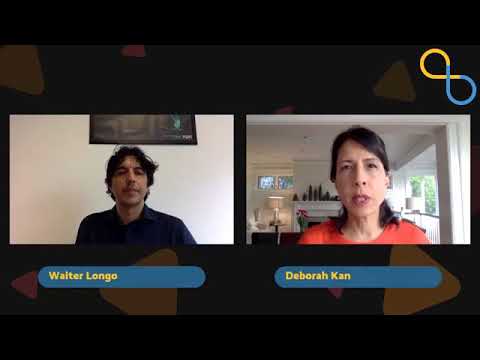Curious about fasting? We talked to a neuroscientist, a biogerontologist, and a molecular cell biologist about fasting diets as a way to support healthy aging and improve overall health.
Fasting diets: They’re all the rage. Across the internet and at bookstore after bookstore, you can find experts promising that a diet that involves abstaining from eating during certain hours or for certain lengths of time can help burn off excess fat, boost your brain power, even lengthen your life. Should you believe the hype? We spoke to brain health experts about the benefits of fasting, including for people living with Alzheimer’s disease. Here’s what we learned.
1. Fasting helps people burn fat
Fat burning is the benefit of fasting that is perhaps most often talked about, but few people understand the science behind it.
According to Dr. Valter Longo, a biogerontologist at the University of Southern California, our bodies respond to fasting due to historical seasonal feeding periods. Humans and animals previously had a surplus of food in the summer, which led them to become insulin resistant and accumulate fat in the summer. In the winter when food was scarce, it was a natural time for the body to enter what Longo refers to as “winter mode.”
“What happens with fasting is that the body goes back to this winter mode,” he said. “So, we become insulin sensitive again and begin burning fat.”
Longo says new research in mice is showing expanded benefits, such as regenerative processes in mice with damaged body functions. The research “clearly shows this shrinking elimination of many damaged components during the starvation period. But then the stem cells and other programs go to work. When the food comes back around, there’s this remarkable regenerative program that brings the organs and systems back to the ideal condition,” he said. “In these fascinating refeeding cycles, we see lots of evidence for a fairly sophisticated, embryonic-like program that fixes lots of things wrong with the system.”
2. Some research shows certain types of fasting can help rewire the brain
One study’s findings suggest that intermittent fasting may be an effective way to increase the efficiency of autophagy, an essential process that breaks down and recycles damaged or unnecessary cellular components and proteins that can build up in cells.
“The fasting-mimicking diet and autophagy are causing a real revolution in the brain’s metabolism. Because now, all of a sudden, the brain is forced to use ketone bodies and rewire in a sense,” Longo said.
“So, we are hoping that all these together may at least be able to help the drugs or do some of the things that the drugs are not able to do,” added Longo. “Just because by the time somebody has Alzheimer’s, the brain is in such an advanced state of dysfunction.”
Claudia Ntsapi, molecular cell biologist at South Africa’s University of the Free State, has shared similar findings from a 2021 animal study on intermittent fasting. Ntsapi and her team found that intermittent fasting counteracted beta-amyloid accumulation in the brains of mice. Beta-amyloid build-up is a common feature in the development of Alzheimer’s.
3. Could a fasting diet reduce neuroinflammation?
Longo recently conducted a study in mice with Alzheimer’s with high indicators of inflammation. He found that fasting lowered the presence of genes in the neuroinflammatory domain of the mice.
“Then when we did the fasting, mimicking diet, many of these [inflammation indicators] were brought back down. It initially showed us hundreds of genes that were increasing in the neuroinflammatory domain,” said Longo. “In many, these are now back to normal, certainly lowered after the fasting-mimicking diet cycle. So now, this hypothesis is that systemic metabolism is tightly connected with the brain.”
Longo said he believes there is a clear connection between metabolic dysfunction and brain health, although the area has yet to be thoroughly studied.
“Diabetes patients have a 75 percent increased chance of developing Alzheimer’s,” he told Being Patient. “A lot of this has been ignored. To this day, it is viewed by the neurobiology community as an additional thing. No, I think it’s not an additional thing about the aging process. I think the metabolic dysfunction, together with brain damage and inflammation, that’s where you now progress to Alzheimer’s.”
4. Fasting and memory for people living with Alzheimer’s disease
Mark Mattson, PhD, a neuroscientist at Johns Hopkins University, told Being Patient about the biological mechanisms that occur during intermittent fasting, and what it means for people living with Alzheimer’s.
“The most abundant and important neurotransmitter in the brain is glutamate. It’s an amino acid – an excitatory transmitter – and over 90 percent of the neurons throughout the brain use glutamate. Those glutamatergic neurons degenerate in Alzheimer’s disease,” Mattson said.
“It turns out that Alzheimer’s patients have increased incidence of seizures, like 20- to 30-fold over age-matched people without Alzheimer’s,” he explained. “There’s this hyper-excitability: unconstrained, improperly regulated activity in those excitatory circuits. What intermittent fasting does is it quiets those neurons by actually increasing the activity of inhibitory neurons. They use the neurotransmitter GABA.”
Beyond the brain benefits of fasting in people living with Alzheimer’s, studies have shown additional benefits in animals.
“A lot of studies in animals have shown that compared to ad libitum feeding, intermittent fasting can enhance learning and memory, and even has an anti-anxiety effect once the animals are adapted to the new intermittent fasting eating pattern.”
How do you start a fasting diet?
For those interested in trying it out, Longo recommends following a schedule of 12 hours of fasting and 12 hours of feeding daily.
“From 8:00 a.m. to 8:00 p.m., eat within that time window. Or 9:00 a.m. to 9:00 p.m., 10 a.m. to 10 p.m., it doesn’t matter as long as you keep it steady,” he said. People practicing fasting should also stop eating three to four hours prior to going to sleep, he added.
Healthy diets 101: Good food contains nutrients that keep us alive. Don’t go long periods of time without eating. If you’re curious about whether a fasting diet would be good for you or a loved one, talk to a nutritionist or to your doctor to learn more.





